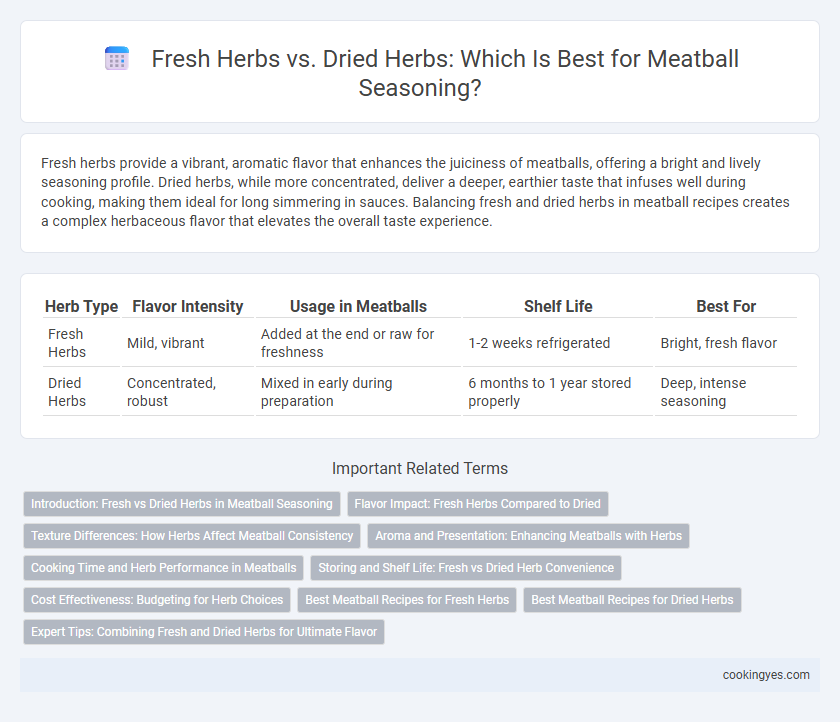Fresh herbs provide a vibrant, aromatic flavor that enhances the juiciness of meatballs, offering a bright and lively seasoning profile. Dried herbs, while more concentrated, deliver a deeper, earthier taste that infuses well during cooking, making them ideal for long simmering in sauces. Balancing fresh and dried herbs in meatball recipes creates a complex herbaceous flavor that elevates the overall taste experience.
Table of Comparison
| Herb Type | Flavor Intensity | Usage in Meatballs | Shelf Life | Best For |
|---|---|---|---|---|
| Fresh Herbs | Mild, vibrant | Added at the end or raw for freshness | 1-2 weeks refrigerated | Bright, fresh flavor |
| Dried Herbs | Concentrated, robust | Mixed in early during preparation | 6 months to 1 year stored properly | Deep, intense seasoning |
Introduction: Fresh vs Dried Herbs in Meatball Seasoning
Fresh herbs offer vibrant flavors and aromatic oils that enhance the juiciness and complexity of meatball seasoning, while dried herbs provide a concentrated, long-lasting taste ideal for slow-cooked mixtures. The choice between fresh and dried herbs depends on cooking time and desired intensity, with fresh herbs best added towards the end of cooking and dried herbs integrated early to allow flavors to meld. Common herbs like parsley, oregano, and basil vary in potency and transformation when dried, impacting the final flavor profile of meatballs significantly.
Flavor Impact: Fresh Herbs Compared to Dried
Fresh herbs, such as parsley and basil, deliver a vibrant and aromatic flavor to meatballs, intensifying their taste profile with bright, natural notes. Dried herbs, though more concentrated, often lose some essential oils during processing, resulting in a deeper but less fresh flavor that can sometimes taste muted or powdery. Using fresh herbs in meatball seasoning enhances the overall flavor impact by providing a fresher, more complex herbaceous presence compared to the earthier tone of dried herbs.
Texture Differences: How Herbs Affect Meatball Consistency
Fresh herbs in meatball seasoning release moisture and delicate oils that soften the texture and create a tender bite, while dried herbs absorb some moisture, leading to a denser and more concentrated flavor profile. The coarser texture of fresh herbs enhances the overall mouthfeel by adding small bursts of herbaceous freshness throughout the meatball. Dried herbs integrate more uniformly but can sometimes cause slight dryness if used in excess, impacting the juiciness and consistency of the meatball.
Aroma and Presentation: Enhancing Meatballs with Herbs
Fresh herbs such as parsley, basil, and oregano release vibrant aromatic oils that elevate the flavor profile and freshness of meatballs, making each bite more fragrant and appealing. Their bright green color enhances presentation, adding a visually appetizing contrast to the rich, browned exterior of the meatball. Dried herbs, while convenient and concentrated in flavor, often lose some volatile oils during drying, resulting in diminished aroma and a less vibrant appearance.
Cooking Time and Herb Performance in Meatballs
Fresh herbs release vibrant flavors quickly during the shorter cooking times typical of meatball preparation, maintaining their aromatic qualities and enhancing overall taste. Dried herbs require longer cooking to fully rehydrate and infuse flavor, making them more suitable for slow-simmered meatball sauces rather than the meatball mix itself. Balancing fresh parsley, basil, or oregano within the meatball mixture ensures pronounced herb performance, while dried variants excel in prolonged cooking applications.
Storing and Shelf Life: Fresh vs Dried Herb Convenience
Fresh herbs require refrigeration and typically last about one week, demanding careful storage in damp paper towels or herb-specific containers to maintain their flavor for meatball seasoning. Dried herbs offer a more convenient option with a shelf life of up to two to three years when stored in airtight containers away from heat and light, ensuring consistent seasoning availability. Using dried herbs simplifies meatball preparation by eliminating frequent purchases and storage concerns, though fresh herbs provide a more vibrant taste when used promptly.
Cost Effectiveness: Budgeting for Herb Choices
Fresh herbs offer vibrant flavor but come at a higher cost and shorter shelf life compared to dried herbs, making dried options more budget-friendly for meatball seasoning. Dried herbs provide concentrated flavor, allowing smaller quantities to be used effectively, which extends their usability and reduces overall expense. Opting for dried herbs balances cost efficiency with maintaining robust seasoning in meatball recipes, benefiting budget-conscious cooking without sacrificing taste.
Best Meatball Recipes for Fresh Herbs
Fresh herbs like parsley, basil, and oregano provide a vibrant flavor and aroma that elevate the taste of meatball recipes. Their natural oils release during cooking, enhancing the overall freshness and complexity compared to dried herbs, which can sometimes taste muted or overly concentrated. Using fresh herbs in meatball seasoning ensures a bright, herbaceous profile that complements the savory meat and adds a gourmet touch to classic dishes.
Best Meatball Recipes for Dried Herbs
Dried herbs such as oregano, thyme, and basil deliver concentrated flavors that penetrate meatballs evenly, making them ideal for slow-cooked or baked meatball recipes. These herbs maintain potency during cooking, enhancing traditional Italian and Mediterranean meatball dishes. For best results, use about one-third the amount of dried herbs as fresh to balance seasoning without overpowering the meat.
Expert Tips: Combining Fresh and Dried Herbs for Ultimate Flavor
Experts recommend combining fresh herbs like parsley and basil with dried herbs such as oregano and thyme to create a balanced and robust meatball seasoning. Fresh herbs provide bright, vibrant notes while dried herbs contribute deep, concentrated flavors that intensify during cooking. Using both types at optimal ratios enhances complexity and ensures flavorful meatballs every time.
Fresh herbs vs Dried herbs for meatball seasoning Infographic

 cookingyes.com
cookingyes.com